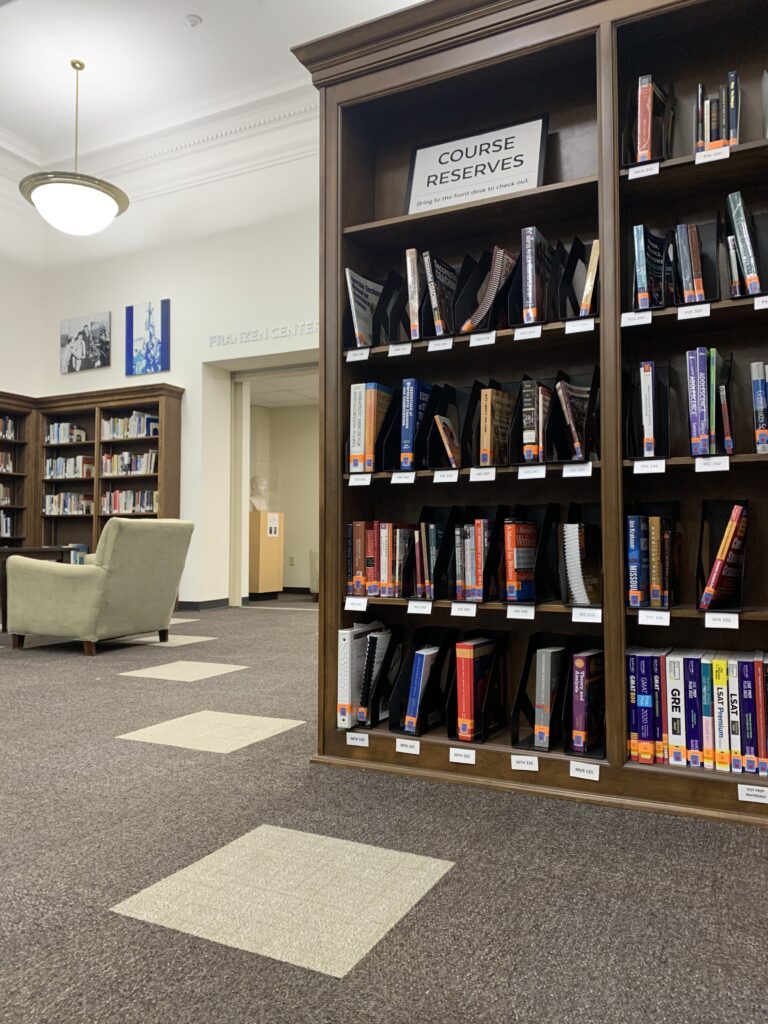By Gwendolyn Frei in College Days, Student Life on March 31, 2022
How Ripon College staff is trying to lessen the cost of textbooks for students.

The course reserves in Lane Library are one of the steps that the college has taken toward more textbook affordability.
Paying for college textbooks is enough to put a dent in most students’ accounts but recently, Karlyn Schumacher, the Access Services Librarian at Ripon College, has been putting a lot of effort into easing the overall costs for students.
“I’m kind of the person who’s been vocal about it on campus… I’d love to see bigger organizational or campus-wide efforts or even just advocacy of the student level,” Schumacher said.
Schumacher was a student at Ripon College before joining its staff full time, so she is well-versed with the problem. In order to combat this issue, she has come up with many different solutions.
“Open educational resources, or OERs, as I’m going to refer to them here, can look like anything. So it could be an online textbook, could be a video, it could be an online course or lecture, syllabus — the sky’s the limit, but the thing that makes them unique is that they’re openly licensed so students can download them,” she said.
Ripon College has dabbled in this idea with the library’s course reserves and, more recently, some professors have been switching to these online, free resources. The potential financial savings is one of its main selling points, but OERs also have the potential to further enrich classrooms.
“Students may be engaged with the material differently. Modifying the material is much different than reading a chapter of a textbook,” Schumacher said. “There’s a potential for some good impacts for students and seeing themselves as creators and scholars and not just consumers of information.”

Ripon College students add to the statement, “With the money I spent on textbooks this semester, I could have…” on a whiteboard in the Franzen Center.
But OERs aren’t the only thing that Schumacher wants to look into.
“Some schools often will have textbooks available for rental. I don’t know how feasible something like that is at Ripon College. I know some schools have scholarships specifically set aside for students who are perhaps under a certain income level or meet other qualifications that can kind of mitigate that issue.” she said.
Of course, another issue that she’s faced is a lack of discussion.
“I think students are very aware of textbook costs, but it doesn’t always seem like there’s something you can really do about it. So I think like stepping up and kind of taking a more active role in pushing for OER or course reserve use [would be helpful].” Schumacher said.
Along with the lack of advocacy among the students, Schumacher discussed the lack of response from the school.
“One of my goals is having some sort of grant system or giving faculty funds and time to help develop these kinds of resources. Because that’s one of the challenges of adopting OER in your classes is that it’s just a lot of time to rethink your whole class structure,” she said.
Overall, Schumacher has seen many frustrated students when it comes to textbook affordability, and she has come up with a few solutions to hopefully lessen the costs for students; she just needs a little more support from the college and its students.
“On a campus-wide level, there’s just room for more advocacy on this issue,” she said, “because I think it’s something that impacts our students directly. Every semester.”


